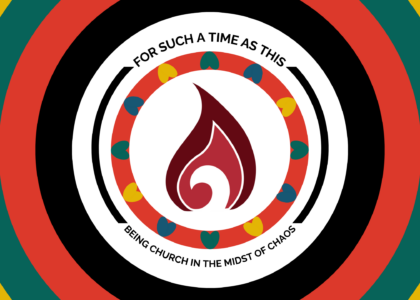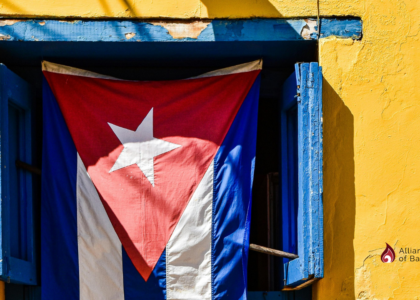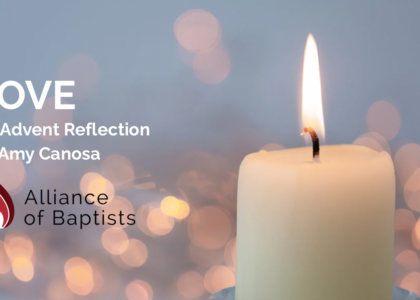By Laura Mayo
Peace be with you. And also with you. Many of us intone these lines during worship each Sunday. In these days, I wonder what we mean when we say peace. In the Gospels of Matthew and Luke Jesus asks, “Do you think that I have come to bring peace to the earth?” And then he answers his own question, “No, I tell you, but rather division” (in Luke) and “No, I tell you, but rather a sword” (in Matthew). In both Gospels Jesus explains: “From now on, five in one household will be divided, three against two and two against three; they will be divided: father against son and son against father, mother against daughter and daughter against mother, mother-in-law against her daughter-in-law and daughter-in-law against mother-in-law.” Perhaps we have all experienced such division. Living for the realm of God and refusing to ignore injustice can create difficult conversations, tense silences at Thanksgiving dinners, and disconnection. Maybe you’ve been unfriended; maybe no one talks to you at breaks anymore because you wouldn’t laugh at the racist, sexist, homophobic joke. Maybe you are being called names because you stood up for trans rights or for bodily autonomy for women and other people with wombs. Maybe you suggested that we have a gun problem in our country and now your uncle won’t talk to you.
Jesus didn’t risk it all to keep the status quo. When he spoke against the religious authorities so entangled with the Empire that they forgot about the poor and the widows it was not to preserve the peace. Jesus was a peacemaker, not a peacekeeper and he clearly expects the same from us. Peacemaking, with its demands for change, can lead to disconnection, to rejection.
In the Gospels, when Jesus sends out the 70 disciples he says, “Whatever house you enter, first say, ‘Peace to this house!’ And if anyone is there who shares in peace, your peace will rest on that person; but if not, it will return to you.” He then continues, “But whenever you enter a town and they do not welcome you, go out into its streets and say, ‘Even the dust of your town that clings to our feet, we wipe off in protest against you (Luke 10). Jesus knows what it is to be rejected. The Gospels tell us of Jesus’ rejection in his hometown; how they drove him from the synagogue and wanted to hurl him from the cliff. We must assume similar rejections have taken place and that Jesus continues to carry the hurt and disappointment. We, like Jesus, know what it is to be rejected. We, like Jesus, know that seeking the peace of the realm of God’s justice often means that the false peace of the status quo, of passivity, of the way things are must be disturbed.
Jesus yearns for “the kingdom of God”—everything he does is about this alternate realm—about God’s kingdom on earth as it is in heaven. For this realm (may it come) to be realized, change is required, demanded. Oppression has to go. Greed has to go. Racism has to go. Exploitation, homophobia, dehumanization, narcissism, patriarchy and any other evils we can name that prevent the flourishing of all people and all creation they all have to go; burned away with the fires of forgiveness and freedom and grace and redemption.
We can expect this to be hard: this living into the kingdom of God—the realm of welcome and love. We can expect to need to shake the dust from our feet from time to time, but some dust is easier to shake free from our sandals than others. Some dust just doesn’t seem to wipe off. Perhaps especially when the rejection is by family or when the rejection we experience has nothing to do with our choices; when the rejection is focused on who we are, on our skin color or who we love. And so we need each other. We stand together. We stand so close that attacks on them are attacks on us until there is no longer the ability to distinguish between them and us.
Jesus doesn’t send out his disciples alone. They go together in groups. Together, the kingdom of God is brought to earth with our peace. The peace of Christ does not mean a lack of conflict, does not mean maintaining the status quo. This peace is not apathy in the face of systemic injustices. Theologian Walter Wink reminds us: “Jesus abhors both passivity and violence as a response to evil . . . The “peace” the gospel brings is never the absence of conflict, but an ineffable divine reassurance within the heart of conflict; a peace that surpasses understanding.” He continues, “Nonviolence must not be misconstrued as a way of avoiding conflict . . . Christians have all too often called for peace, for ‘nonviolence’ when they really meant tranquility.” Wink continues, “Nonviolence, in fact, seeks out conflict, elicits conflict, exacerbates conflict, in order to bring it out into the open and lance its poisonous sores. It is not idealistic or sentimental about evil; it does not coddle or cajole aggressors, but moves against perceived injustice proactively.”
This is what Jesus encourages the 70 to share with those they encounter: “Whatever house you enter, first say, ‘Peace to this house!’ And if anyone is there who shares in peace, your peace will rest on that person; but if not, it will return to you.” The work of peace is not lost. The work of peace is not passive. Jesus’ repeated teachings through words and action is a way of being in the world that breaks the spiral of violence and injustice.
This means we cannot give up. We cannot keep silent. We cannot pretend everything is fine. There is too much at stake. Real people are suffering. Real people are being told they don’t belong and are not welcome. Real people are being told not to teach our country’s real history in school; being told their identity cannot be shared, that they are not welcome, acceptable, worthy of love.
Are we willing to argue, to be ridiculed, to be uncomfortable and to potentially make others uncomfortable in order to call ourselves and others to justice? Could apartheid have ended in South Africa, or slavery in the United States, or segregation and a century of Jim Crow, without division? And what about the divisive struggles over truth: evolution, the intelligence of women, justice for the poor, bodily autonomy, respect for same-gender love? It seems to me that it has always taken dissent to create change. Dissent is still required, especially where justice is lacking. Each generation has its appeals for justice: these cries for justice tap into a rhizome of righteousness that crosses millennia.
We are God’s hands and feet on earth and though they may stop one of us, they cannot stop all of us. John the Baptist’s movement was ended with the single sword stroke that took his life. Herod had no trouble ending John’s power and dispersing his followers. But Jesus decentralized his movement, he sent out disciples and became unstoppable.
By the time Jesus was crucified it is estimated that there were hundreds of disciples scattered all over. Hundreds were spreading real peace, not superficial placidity. They were healing and telling the good news that the Kingdom of God has come near. The Roman Empire and its cruel cross couldn’t stop it—this movement of love—God’s kingdom: couldn’t then and can’t now. No court can stop us; no rejection can stop us; nothing.
My beloved Alliance of Baptists community, consider what dust you need to shake off. Go outside and create your own ritual by wiping your shoes on the sidewalk or shaking your feet in the garden. Let’s free ourselves of any hate, bigotry, rejection hurled upon our heads, and let’s reclaim our peace, real peace. Then together, let’s keep going, keep offering peace, keep living for the realm of God.

Rev. Laura Mayo is the Senior Minister of congregational partner Covenant Church in Houston, Texas. She is a graduate of Carson-Newman College in Jefferson City, Tennessee and Wake Forest University Divinity School in Winston-Salem, North Carolina. Laura is active in Houston interfaith work and is regularly published in the Houston Chronicle and Baptist News Global. Laura has served on the board of the Alliance of Baptists.





Recent Comments